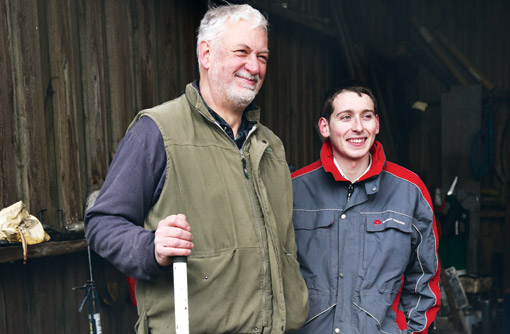So You Want To….take on an apprentice

Apprenticeships offer a structured route into agricultural work, building skills and experience to the benefit of employee and employer. Robyn Vinter reports
How does it work?
An apprenticeship is a work-based training programme designed around the needs of an employer and leading to a nationally recognised qualification.
Agricultural apprenticeship numbers have doubled in England over the past three years to 850 in 2010-11, but more employers are needed if this trend is to continue.
Farming apprentices follow frameworks designed by Lantra with compulsory and optional components. They are encouraged to choose components that fit with their farmwork, while other elements can be studied at college.
Apprentices usually work on the farm four days a week and go to agricultural college for the remaining day to study elements such as health and safety, employment regulations and working relationships.
A mentor from an agricultural college provides support to both apprentice and employer, with most assessment carried out on the farm, roughly every 10 weeks.
Agricultural apprenticeships tend to last 18 months and a minimum of 530 guided learning hours are needed to complete the course, including time spent both at work and at college.
The employer signs a contract to commit to 18 months but has no responsibility for their apprentice after that.
What are the benefits?
• Agriculture has a people and skills shortage – work-based learning is a practical way for those entering the sector to gain necessary skills and knowledge
• With 41% of agricultural workers older than 50 and the key decision-maker on farms aged about 55, the industry needs to attract new and younger workers, says Lantra
• Apprenticeships can guarantee a skilled workforce, whether taking on an apprentice or hiring someone who has completed an apprenticeship elsewhere
• Equipping and training staff and giving them new responsibilities can help increase productivity and minimise staff turnover and workplace accidents
• For 16 to 18-year-old apprentices, the government pays the cost of college-based study
• A 2008 study for the National Apprenticeship Service found 77% of employers thought apprenticeships made their business more competitive, 76% that they increased overall productivity, 88% believed that apprentices led to a more motivated and satisfied workforce and 83% relied on apprenticeships to provide skilled workers for the future.
What are the responsibilities of the employer?
Employers must provide apprentices with an induction and on-the-job training.
Apprentices should be treated like any other employee and are subject to the same regulations such as working time, health and safety, equality laws and should be given at least 20 days’ annual paid holiday a year as well as bank holidays.
What are the costs? Is there any funding?
The National Minimum Wage for agricultural apprentices is £3.57 an hour, nearly £1 more than the minimum wage for other types of apprentice. This increases with age and after one year rises to:
• £3.68 for 16 to 17-year-olds
• £4.98 for 18 to 20-year-olds
• £6.08 for over 21s
The National Apprenticeship Service can cover some or all of the cost of the mandatory training part of the apprenticeship scheme, which is usually studied at college.
• Up to 100% for 16 to 18-year-olds
• Up to 50% for 19 to 24-year-olds
• Contribution for specified places for over 24s
Employers of 16 to 24-year-olds can also get an apprenticeship grant which helps small and medium-sized businesses with paying an apprentice’s salary. Each grant is worth £1,500, paid in two equal instalments at eight weeks and at 12 months.
What holds employers back from taking on an apprentice?
Alastair Johnston, industry advisory board member at Lantra and member of the AgriSkills forum, thinks farmers are put off taking on an apprentice because they perceive it takes a lot of time, money or organisation.
“You do have to spend some time training an apprentice, but once you have shown them the ropes they’re able to complete many of the more repetitive tasks on their own, freeing-up some time for you to spend on other areas of your business or give you a better work/life balance.
“Many farmers think they cannot afford to take on another member of staff full-time and prefer to take on seasonal workers. The difference with an apprentice is that their education, skills and training are tailored to your business, meaning you get a great deal of consistency and problems are much easier to foresee. If you bring in someone ad hoc you may not always be sure you can rely on them and by the time any problems occur it might be too late.
“If you’re concerned that you don’t have enough work, or a broad enough range of jobs for an apprentice you can set up an Apprenticeship Training Agency with other local farms and share the apprentice. Lantra can help with setting these up and can put you in touch with others in your area who want to take part,” Mr Johnston said.
How do I get involved?
Some apprentices already know their employer through work experience, family connections or being a current employee, but many apprenticeships are arranged by agricultural colleges.
“If an employer’s interested, the first thing they should do is give the college a call and we’ll try and match their needs to a student we’ve got,” says David Lamb, head of agriculture, countryside and gamekeeping at Plumpton College.
“Then we’ll send someone out to do a health and safety assessment of the farm and once we’ve got a suitable candidate we’ll get them signed up on a contract.” Although there is currently no shortage of workplaces for Plumpton College students, having more places available would mean that apprentices could be better matched to farms.
• For more information on apprenticeships visit http://www.lantra.co.uk/Standards-and-Qualifications/Apprenticeships.aspx or contact your local agricultural college.
APPRENTICESHIP STRUCTURE
There are two levels of agricultural apprenticeship – Level 2 Intermediate and Level 3 Advanced. Typical roles include:
Intermediate Level Apprenticeship
• Farmworker
• Tractor driver
• Stock person
• Pig technician
• Hatchery staff
Advanced Level Apprenticeship
•Section head – pigs, dairy or beef
•Agricultural machinery operator
•Assistant farm manager
•Livestock technician
•Hatchery supervisor/charge hand (poultry)
•Shepherd
An Intermediate Level Apprenticeship is viewed as an entry route into the sector but also can be used as a stepping stone to Advanced Apprenticeships, BTEC or Diploma qualifications.
An Advanced Level Apprenticeship can lead to a HND/C, Foundation Degree or Degree (BSc).
Case study 1: Cooperative Farms, Berwickshire
Liam Logan, 21, was unemployed for two years before becoming an apprentice with Co-operative Farms at Whitsome Hill Farm in Berwickshire.

After previously working in shops and factories he was looking for a more interesting career and is now learning about key areas of the farm business – cereal and root crops, vegetable and fruit growing.
“Since I started on The Co-operative Farms’ apprenticeship scheme I’ve not looked back. I love being outdoors in the fresh air and I’m doing something different and learning something new every day, from the basics in grain store management to arable farming to how to drive forklift trucks and tractors,” he says.
“It can be hard work though, especially during the harvest, but it’s also great fun too. I would definitely recommend apprenticeships, especially if it’s a career someone is interested in. And what’s better still is that as well as learning new skills and gaining qualifications and vital practical experience, you also get paid and there is a real chance of a job at the end.”
David Watson, who oversees The Co-operative Farms’ apprenticeship scheme, added: “We have been impressed by all of the apprentices, many of whom had no previous farming experience, who have demonstrated fantastic enthusiasm, motivation and commitment.”
Case study 2: Balcombe Estate, West Sussex
Peter Harding is farm manager at Stonehall Farm on the Balcombe Estate in West Sussex. The 351ha farm has 220ha of arable and 260 home-bred Aberdeen Angus cross suckler cows.
It employs five full-time staff, including 18-year-old apprentice Jack Weeks, to work on the farm and other estate departments, as well as doing some contracting work.
Mr Harding employed Mr Weeks as an apprentice after successful work experience on the estate and thinks other businesses could have a lot to gain from taking on an apprentice.
“There’s no reason why everyone shouldn’t give it a go. We need more young people in the industry and we need to give them a chance,” says Mr Harding.
“The business benefits in that we have a young person on the farm who looks at things a little bit differently. It just sharpens us up a bit.
“With an apprentice, you’ve always got to work on the basis that they don’t know and you’ve got to make sure they’re working in a safe, controlled environment,” he says.
For Mr Weeks, the practical nature of the apprenticeship is more appealing than a full-time college-based course.
“It’s basically like working, so I come here most of the week and then go to college once every two weeks. I like it because it’s work-based. I’m at work more than college – plus, I get paid,” he says.
“I think others should do it. I really enjoy being in an apprenticeship and I think if you want to do it then try it.”
